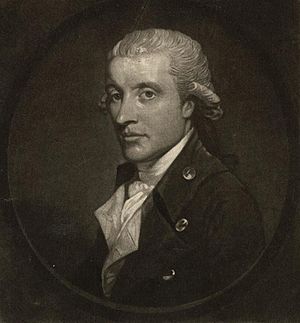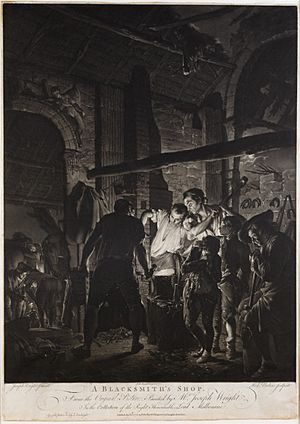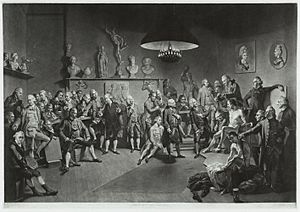Richard Earlom facts for kids
Richard Earlom was a talented English artist who lived a long time ago (from 1743 to 1822). He was especially known for a special way of making prints called mezzotint.

Contents
About Richard Earlom
Richard Earlom was born and passed away in London, England. He loved art from a very young age. He was especially amazed by the beautiful paintings on the Lord Mayor's special coach. This inspired him to try copying the pictures!
He then went to study art with a teacher named Giovanni Battista Cipriani. Richard was a very skilled drawer. He also taught himself how to create mezzotints. This is a special way to make prints that creates soft, rich tones, almost like a painting.
Working with John Boydell
In 1765, a man named Alderman Boydell hired Richard. Boydell was a publisher who helped artists share their work. Richard's job was to make drawings of famous paintings at a place called Houghton Hall. He then turned these drawings into mezzotint prints.
Some of his most famous works are prints of fruit and flower paintings by Dutch artists like Van Os and Jan van Huysum. He also created prints of historical scenes and people. These included works after famous painters like Benjamin West, Guido Reni, Johan Zoffany, and Sir Joshua Reynolds.
The Liber Veritatis Project
Richard Earlom was given a very important job by John Boydell. He was asked to copy all 200 drawings from a special book called Liber Veritatis. These original drawings were made by a famous artist named Claude Lorraine. Claude used them to keep a record of all his paintings.
Earlom's prints were published between 1774 and 1777. They were then collected into two books, also called Liber Veritatis. The title means "Book of Truth." These prints were very special because they looked a lot like Claude's original drawings. Earlom used etching for Claude's pen lines and mezzotint for the ink washes, which made them look very realistic.
Why Liber Veritatis Was Important
The prints in Liber Veritatis were a huge success! They were reprinted many times. Art teachers even recommended them as models for students to copy. These prints greatly influenced how English watercolour artists worked, including artists like Francis Towne.
Today, Claude Lorraine's original drawings from Liber Veritatis are kept at the British Museum.
 | Laphonza Butler |
 | Daisy Bates |
 | Elizabeth Piper Ensley |



